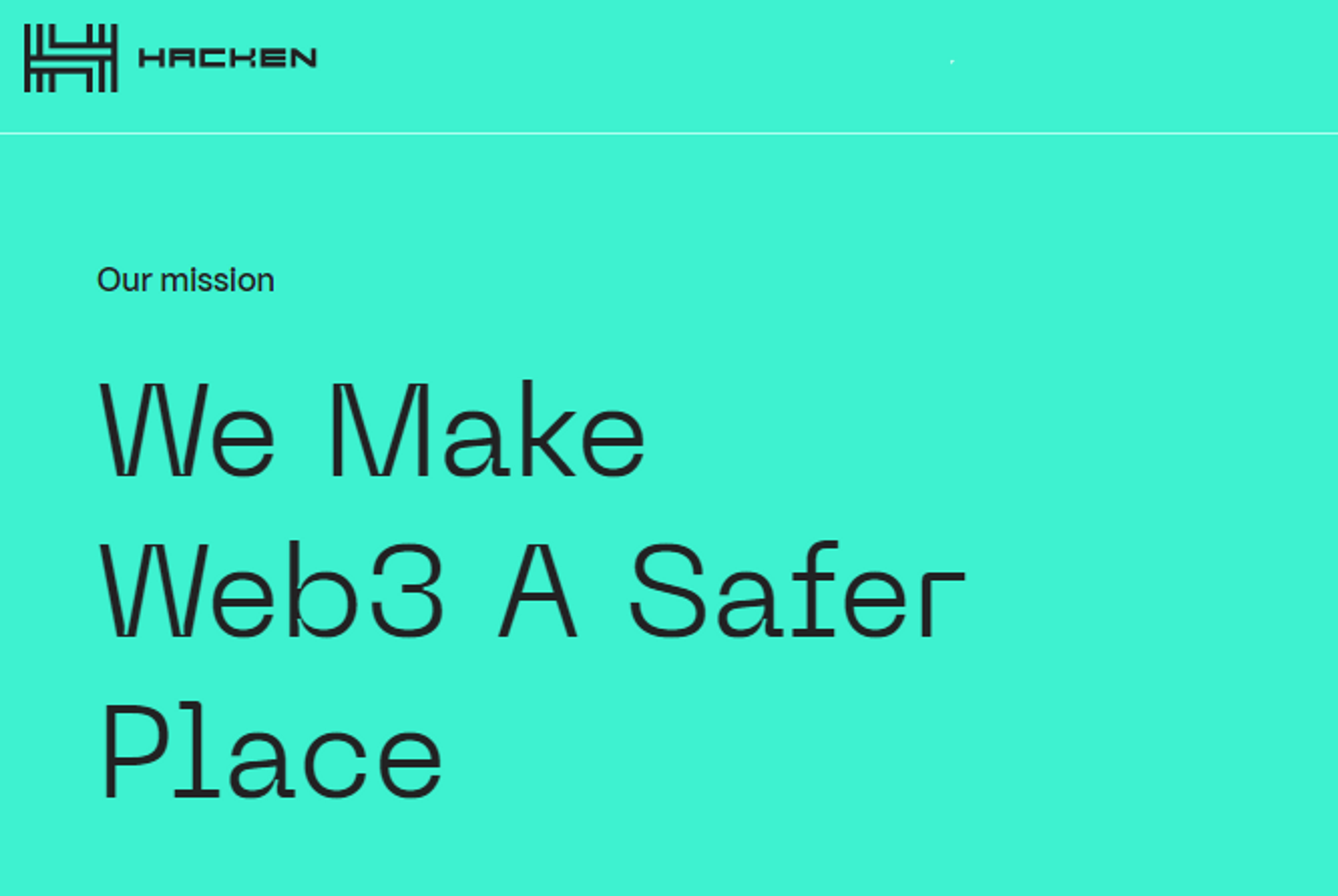
Ethical Cybersecurity: Hacken's Vision for a Safer Web3

Blockchain technology has paved the way for Web3 as we know it. It has majorly overhauled the many facets of the digital world, perhaps most importantly, redistributing data back to its rightful owners—power back to the people. Web3's decentralized nature promises transparency and user autonomy, which people increasingly demand as data continues to slip out of their fingers.
But what’s the catch?
Web3 is as disruptive as it is intricate. Its open-source architecture, while empowering users and market participants, introduced a new frontier of security risks ripe for black hats to exploit.
We’ve had the privilege of talking to the Co-Founder & CBDO of Hacken, Yevheniia Broshevan, about the importance of cybersecurity in Web3 now more than ever.
The Need for Cybersecurity in Web3

Screen capture from https://hacken.io/about/
“Despite the numerous advantages offered by blockchain technology, it is crucial to acknowledge the persistent threats within this ecosystem. 2023 witnessed an alarming surge in unauthorized transactions, resulting in substantial financial losses for both crypto builders and users.
Incidents ranged from widespread rug pulls to prolonged breaches affecting centralized businesses for extended periods. The level of attack sophistication increased significantly, encompassing technical execution and a broader array of impactful strategies.
The cumulative losses for the year amounted to a staggering $1.9 billion, with access control breaches and flash loan attacks emerging as primary concerns.
This underscores the imperative role that cybersecurity plays in the Web3 landscape, a factor that cannot be underestimated.”
Blockchain breaches have a deep-seated impact on Web3 projects and their communities. Financial losses resulting from scams and rug pulls not only hit investors but also undermine trust, creating disorder in blockchain communities and stifling collaborative efforts.
Adoption becomes more challenging as users lose confidence in the system. Additionally, regulatory scrutiny heightens, posing a threat to the autonomy that Web3 projects aim to maintain.
Unique Cybersecurity Challenges in the Blockchain
The blockchain industry stands out primarily because it is disruptive and breaks free from tradition. But just like any well-intentioned solution, this distributed ledger system pushing for transparency comes with its own set of cons. Here are the top vulnerabilities Web3 has seen:
- Smart Contract Vulnerabilities - Smart contracts are self-executing contracts with the terms of the agreement directly written into code. While smart contracts offer much more in terms of accuracy and efficiency, they are still susceptible to coding errors and data breaches. Exploiting flaws in smart contracts can lead to a slew of challenges as bad actors gain access to sensitive information.
- 51% Attacks - A 51% attack occurs when a single entity or group controls more than half of the network's mining power—majority vs minority—common in blockchain networks with Proof-of-Work (PoW) consensus algorithms. We have seen this play out in well-known platforms, such as Horizen (formerly ZenCash) and Ethereum Classic. This level of control allows the attacker to potentially disrupt the entire blockchain through manipulation and double-spending.
- Supply Chain Attacks - Hackers can compromise the security of the blockchain by infiltrating the development and deployment process in what’s commonly known in cybersecurity as a “supply chain attack” or “value-chain attack”. Tampering with the supply chain, which often involves compromised code or hardware, poses a significant threat to the overall integrity of the blockchain system.
- Rug Pulls - Rug pulls are quite prevalent in the crypto space—someone enthusiastically promotes a project, a new coin or an NFT release, only to vanish with all the funds invested. Blockchain provides culprits with the means to shield their identities effectively, making them all the more difficult to track and hold accountable.
- Sybil Attacks - Sybil attacks involve creating multiple fake identities or nodes to gain control over a significant portion of a network. By manipulating the number of nodes, attackers can influence network decisions and even execute DDoS attacks.
Ethical Cybersecurity: Hacken’s Vision for a Safer Web3
Hacken envisions transformative digital asset protection that goes beyond conventional cybersecurity measures. Central to this vision are ethical safeguards that reflect the company's commitment to building a more trustworthy Web3 since 2017:
- Smart Contract Audits - Reinforce your smart contract with double line-to-line code analysis and a separate review by a lead auditor to address weaknesses and enhance functionality.
- Blockchain Protocol Audits - Enhance your protocol's security and resilience against real-world cyber attacks with the help of our blockchain researchers.
- dApp Audits - Conduct thorough audits of your dApp to ensure a safe and secure interaction with the blockchain network.
- Penetration Testing - Identify Web3 project vulnerabilities through proactive testing in a secure and controlled environment simulating cyber attacks.
- CCSS Audits - Elevate security with a CryptoCurrency Security Standard Auditor.
- HackenProof - Expert bug bounty platform for crypto projects.
- CER.live Cybersecurity Rankings
- Extractor On-chain Monitoring - Real-time protection from assets loss
Honesty with investors is another pillar of Hacken's vision. Hacken sets itself apart by prioritizing open and truthful communication with its investors. This commitment not only builds trust but also reinforces the integrity of Hacken’s partner projects.
“As we enter 2024, our optimism is fueled by the significant strides we made in the previous year. We have assembled a robust tech team and expanded our product portfolio, positioning us for continued success. Our focus extends to broadening our client base, forging partnerships with enterprises entering the Web3 arena, and collaborating with government organizations. The imminent introduction of RWA marks a pivotal moment in Hacken's history, signifying a new chapter in our ongoing commitment to enhancing cybersecurity within the evolving landscape of Web3.”
Hacken places a strong emphasis on respecting the community and fostering trust in a digital environment fraught with risks. By prioritizing the well-being of users and creating a trustworthy space through ethical security measures, Hacken aims to contribute to a safer Web3 for all participants.
Kairon Labs has recently partnered with Hacken, joining the call for a safer Web3 across all market participants through our ethical brand of market making.
Learn more about Hacken:
- Website: https://hacken.io/about/
- Twitter: https://twitter.com/hackenclub
Kairon Labs provides upscale market-making services for digital asset issuers and token projects, leveraging cutting-edge algorithmic trading software that is integrated into over 100+ exchanges with 24/7 global market coverage. Get a free first consult with us now at kaironlabs.com/contact
Featured Articles


Understanding Market-Making Models in Crypto

Solana Staking ETFs: A Live Liquidity Stress Test for Every Founder

Launching a Token 101: Why is Liquidity Important?

Airdrops and Retrodrops Decoded: A Comprehensive Guide
